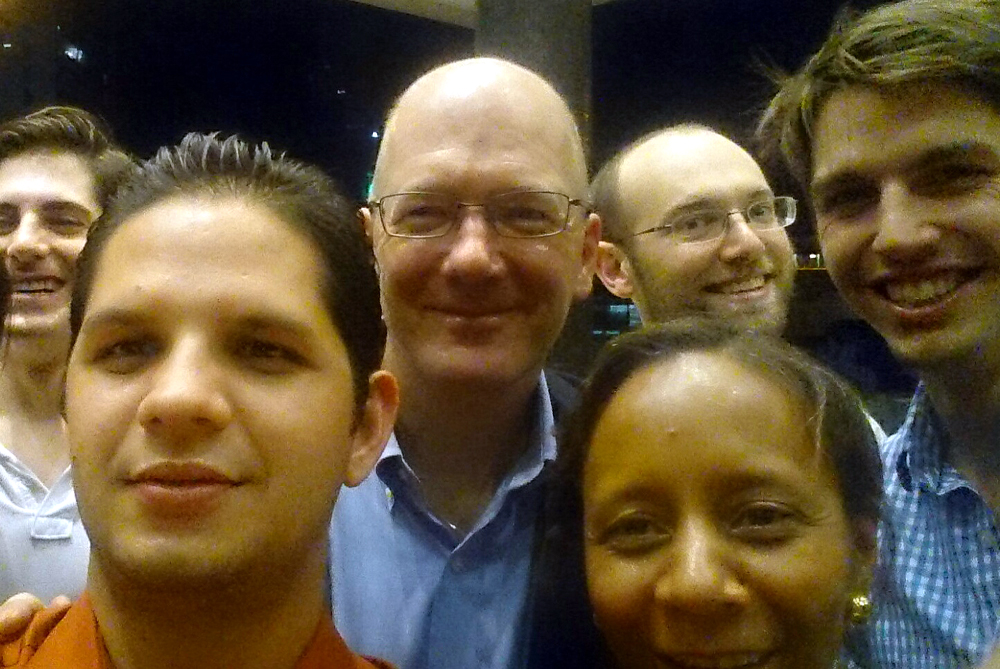
Google Ideas: We’re neither naïve nor paranoid
HAVANA — They are emissaries of one of the world’s most influential corporations and walk through the streets of Havana talking about building bridges. They cannot break away from a past in which they were complicit to wrong policies toward Cuba but they come in an official capacity and we can see improvements in comparison with a previous visit.
Those who write about them in the media have not even seen them in person, so it may be time to comment on Google Ideas, or at least on our several hours of conversation with its visiting executives.
The youngest in the group says that he has been in Cuba before. In his first visit, he hated the island; in his second, he got used to it; in the third, he didn’t want to leave.
The rest are making their first visit to the island, except for Brett Perlmutter, a developer of Google Ideas, who accompanied Eric Schmidt, Google’s executive chairman, in his visit last summer. Brett is a lot younger than we expected and, according to his companions, “ran up and down everywhere” trying to get Washington to give Cuba access to Google’s products.
To thank him for the possibility to download Google Chrome was as necessary as to remind him that there are still Google services unavailable to us, something that perhaps our visitors weren’t aware of.
Seated at the same table is the only woman in the group, who identifies herself as a representative of an organization that creates Internet infrastructure in underdeveloped countries. She has just returned from Africa and comes to Cuba to support our efforts to gain access to the WorldWide Web. We’re not the only country without it.
She doesn’t say it explicitly, but it’s clear that Cuba is on the waiting list. If too many obstacles pile up, Google will simply go on to the next country that needs attention.
I might feel uncomfortable sharing a table with representatives of a technological monopoly, but I live in Cuba, the home of ETECSA, so the discomfort vanishes quickly. It is replaced by a feeling of apprehension, because I’ve done my homework before meeting these folks.
Google Ideas is said to be a think tank with strong ties to the U.S. State Department and evidently plays a role in U.S. foreign policy. That feeling of reservation will not leave me all night.
Seated before me is Scott Carpenter, associate director of Google Ideas. He asks about the spread of information and how Google is viewed from Cuba. After we mention “the weekly package” as a national alternative to lack of connections, we get to quiz the Google envoys.
Their ban on most of their programs has hurt their image in Cuba in the extreme, we tell them. They should repair the damage and give us access to all their programs as a gesture of good will and, beyond that, justice.
We keep on talking and the evening comes to a peak. Someone asks why we Cubans are so reserved in our meetings with them, something they have perceived since their arrival. I answer that we have reasons to believe that their country has not renounced its intention to effect a regime change in Cuba. We need concrete signals that we can turn over that page of that old policy.
A proper relationship between Google and the Cuban state institutions would be an excellent signal, I say. They tell me that they could arrange for virtual visits to Cuban museums and organize academic exchanges of specialists. The evening is ending in an upbeat mood.
We all share the concern that an organization as dynamic as Google could easily run into the slowness of our institutions, which are less adaptable to new scenarios.
That’s only part of what we talked about that night but, as usual, what’s most important in a dialogue is what is not spoken — what is going through the mind of Scott Carpenter. As we bid one another goodbye, it seems strange to give our Gmail address to the Google envoys, who (ironically) use iPhones instead of the Motorola devices their company promotes.
I should point out that this is an official visit in a new context, that is, we have not heard that on this occasion the “Googlers” visited the famous blogger [Yoani Sánchez] in Nuevo Vedado. We can be skeptical of their intentions but obviously there are differences between this visit and the previous one.
It doesn’t seem right to me that the media have only reported their presence in educational centers. The tendency to report the news halfway can only lead to half-truths. The main dish on their menu was an encounter with officials of the Cuban Telecommunications Company (ETECSA), along with other contacts related to the communications world.
The mindset of confrontation could make us think that it’s all a plan concocted by the USAID (maybe, maybe not) and could put us on the defensive in a process that really requires delicate negotiation, without naïveté or paranoia. Could somebody please clone Josefina Vidal?
To have the rare privilege of sharing a long night among nerds from programs like Gmail or YouTube is more than just a personal experience; it’s an opportunity to talk about needful things.
Even so, with these encounters one runs the risk of becoming a cliché, of reproducing a scheme we have often criticized, i.e., always calling on the same people to deal with everything, ignoring the young thinkers in our very own midst.
For that reason, we did everything possible to make this a social visit. We had arranged for an informal gathering with a broad spectrum of journalists and engineers who, without making concessions to the “Googlers,” could share a table with them and give them a fairly precise image of what us Cubans need and long for.
That kind of encounter was not possible; the visitors’ itinerary was tighter than expected and did not allow it. But it is vital to continue democratizing gatherings like this one, so that “only authorized voices” are not heard.
I should stress that the visitors’ tour of educational institutions and their contacts with Cuban businesses were scheduled in cooperation with the Cuban authorities. Nobody should think that some functionary gave them such access unwisely or that their visit was not scrutinized at the highest levels.
As I return home, I think that I laughed excessively during our conversation. It is hard not to sympathize with this group of nerds and maintain a good relation with them — which is not the same as trusting them.
I don’t know what Google’s ideas are, but they have favorably changed their attitude in comparison with the past. At least, that’s my impression.
Harold Cárdenas Lema is a Cuban blogger, one of the founders of the blog La Joven Cuba.
Progreso Weekly authorizes the total or partial reproduction of the articles by our journalists so long as source and author are identified.


